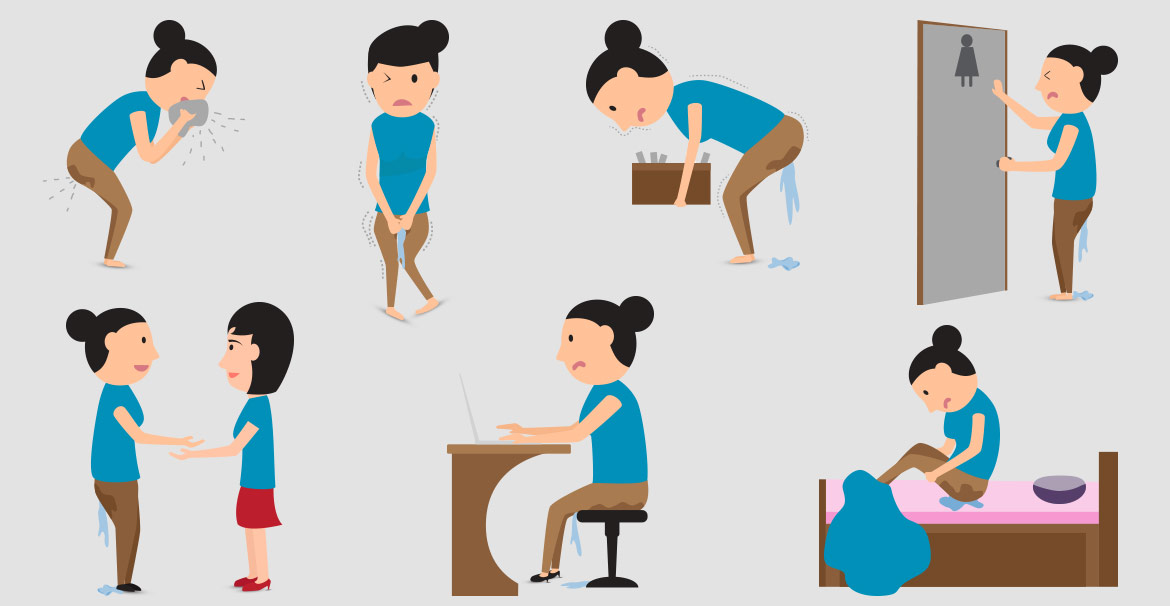What Are The Signs Of Vaginal Problems?
Itching is quite a common occurrence, but it can worsen the infection as it forces women to scratch the vagina.
- Reddened patch that resembles a rash appears and may have some bumps on it.
- Pain when passing urine.
- Pain during sexual intercourse can be equally discomforting just like the pain experienced by women during urination.
- Unusual vaginal discharge which may be unusual in colour and smell unpleasant.
- Vaginal bleeding between periods, after sex or after menopause.
- Low abdominal (tummy) pains.
Causes Of Vaginal Problems
- If you experience unusual odour coming from your bikini line, trust us, you'll know something is up. It could be a bacterial infection or yeast infection. This happens when an overgrowth of yeast or healthy bacteria present in the vagina occurs due to douching, pregnancy, hormonal changes or use of antibiotics.
- Skin creams, perfumes, self-adhesive sanitary pads and also excessive washing for that matter can irritate the vaginal area. This is because your vaginal area is moist and warm and therefore, seems to be very sensitive to chemicals that favour the absorption of chemicals by the skin.
- Unhygienic toilet habits can also make you a slave of a vaginal problem.
- Vaginal infections can also be caused by unprotected sexual intercourse or skin-to-skin contact. It can also result from having sex with a new partner or with multiple partners.
- The vaginal problems could have a tonne of other possible causes which include vaginal dryness, vaginal irritation and infection and vaginal thrush which are still unexplored.
Types Of Vaginal Problems
While vaginal problems are mostly related to infections, following conditions are also associated with them.
Urinary Incontinence
Vaginal Discharge
Vaginal Loosening
Urinary Incontinence
It's estimated that about 3 million people in the UK are regularly incontinent. Overall, this is about 4 in 100 adults. However, as many as 1 in 5 women over the age of 40 have some degree of an overactive bladder. Millions of women suffer from urinary incontinence, which can be uncomfortable and embarrassing for them. Although, thanks to advances in modern research, there are now a variety of clinically-proven urinary incontinence products on the market. It's likely that the true number of people affected is much higher as people often deny the reality of this unpleasant fact to avoid embarrassment.
What is urinary incontinence?
If you have urinary incontinence it means that you pass urine even when you don't mean to. This means that you can't always control when you urinate. This situation can range from leaking a small amount of urine to having a very strong and uncontrollable urge of urinating. You may find it embarrassing to consult your doctor about it or also presume it to occur due to ageing and leave it untreated, which may lead to urinary tract infection.
Urine is stored in the bladder. It leaves the body through a tube that's connected to the bladder called the urethra. The image below will assist you to get a clear understanding of this phenomenon. Muscles in the wall of the bladder contract to force urine out through the urethra. At the same time, sphincter muscles around the urethra relax to let the urine pass out of the body. The constant urge for urination happens if the bladder muscles suddenly contract or the sphincter muscles aren't strong enough to hold back urine.
It's important to understand that this urinary disorder isn't a disease, it's a symptom. It can be caused due to series of factors. A thorough evaluation by your doctor can help you determine real cause behind your involuntary urination.

Common causes of urinary incontinence
Urinary incontinence is most common in people older than 50 years of age, especially women. It's essential to know the biological cause of this disorder first to nullify it.
Stress: Leakage problems also happen with coughing, sneezing, exercising, laughing, lifting heavy things, and other movements that put pressure on the bladder which is referred as Stress incontinence.
Other causes of unintentional loss of urine that can affect women and men are:
- Pregnancy and vaginal birth
- Obesity
- Menopause
- A family history of incontinence
- Ageing – although incontinence isn't an inevitable part of ageing
- Infection
- Caffeine and alcohol
How to prevent urinary incontinence?
There are several self-help techniques you can do to reduce the chance of developing this bladder problem such as:
- Controlling your weight
- Avoiding or cutting down on alcohol
- Exercising the pelvic floor muscles
Besides this, you can use the right leakage solutions. Stop suffering in silence rather fight the problem with our all-natural product range. However, while trying out various measures it's important that you talk about your battle of incontinence with your doctor.
Vaginal Discharge
Vaginal discharge and odour are part of the same problem. It can appear as a slimy secretion in the crotch area. This fluid is formulated in the vaginal mucosa and is present in bacterial flora. This bacterial flora is forced to change when the pH balance of the vagina is disturbed. This can be caused by intercourse, yeast infections and fungal infections. Having multiple sexual partners can also lead to a change in pH balance. It's completely natural for women to experience vaginal discharge; however knowing the signs of when it's bad is imperative. The tell tale sign is foul smelling discharge.
Causes of vaginal discharge
The vagina is made up of millions of good and bad bacteria that make up a healthy and natural pH balance. When this balance is disturbed, it can lead to vaginal itching and yeast infections. Vaginal discharge is typically due to the numerous microorganisms that normally work in harmony, not working in harmony anymore. The following are some of the causes of it:
- Usage of birth control pills or antibiotics and steroids
- Bubble baths and scented soaps or body wash
- Thinning or drying of vaginal membrane walls during menopause
- Bacterial vaginosis, an infection common in pregnant women
Types of vaginal discharge
There's a common misconception that when you have a yeast infection, vaginal itching, or any type of infection in your intimate region that it all must be the same. However, there are many different causes and types of vaginal discharge - knowing what you're suffering from can help you to find the correct solution.
| Types and Colours of discharge | What it may mean | Other symptoms |
|---|---|---|
| Bloody/Brown | Usually means irregular menstrual cycles, however in rare cases can mean endometrial or cervical cancer. |
Pelvic pain or abnormal vaginal bleeding. |
| Cloudy/Yellow | Gonorrhea | Pelvic pain, urinary incontinence or bleeding between periods. |
| Frothy/Yellow or Greenish with a foul smell | Trichomoniasis. | Itching sensation and pain whilst urinating. |
| Pink | Shedding or flaking of the lochia (uterine lining) after childbirth. | |
| Thick/White | Yeast infection. | Pain during intercourse, or pain or an itching sensation and swelling around the vulva. |
| White/Grey or Yellow with a Fishy Odour | Bacterial vaginitis. | Swelling of the vulva or vagina, and/or redness and an itching sensation. |
How to avoid vaginal problems?
Although this may sound very trivial, it can sometimes be overlooked. Follow our easy steps to ensure you keep your vaginal health in its best condition.
- Use mildly scented soap and water to wash, and always rinse well after.
- Always try to wipe from the front (vagina) to the back (anus) as this will help avoid the spread of a yeast infection and bacteria.
- Avoid wearing underwear that doesn’t allow your intimate area to breathe. Cotton underwear is always good as it keeps your genital area dry and doesn’t hold in moisture and warmth.
- If you’re in a swimsuit, change out of it as soon as possible.
- Change tampons and pads regularly.
Vaginal Tightening
Sex isn’t always as smooth as shown in the movies. There are many different things that can make sex less pleasurable and exciting. A loose vagina is one of the common reasons that ruins the sex life of many couples. Women that have a loose vagina may find they no longer enjoy sex and that it no longer causes sensations and pleasure. In fact their partner no longer enjoys sex as the penetration is too easy and lacks friction.
A loose vagina can lead to loss of sensitivity that can affect sexual satisfaction for you and your partner. Thankfully, there are methods that can help in tightening vaginal muscles even without surgery.
One of the most common vaginal tightening methods that sex therapists recommend is kegel exercises. Kegel exercises strengthen your pelvic floor muscle and help in tightening the vagina muscles. You can practice kegel exercises anywhere, anytime and the best part is that they're discreet. Practicing kegel exercises regularly not only assists in tightening vaginal muscles but it also intensifies orgasms and improves bladder control. You can easily learn to perform kegel exercises with regular practice.
Another method of vaginal tightening is vaginoplasty – a surgical procedure that tightens the vaginal muscles and surrounding tissues. The procedure is performed by a surgeon and takes around an hour. However, complete recovery takes around 2 to 3 weeks and there's a chance of scarring. Moreover, there's a hefty price tag attached to the procedure.
Vaginal cones and electric stimulation are other ways of tightening the vagina but they aren’t very effective.
Lately vaginal tightening creams, gels and lotions have gained huge prominence among women who wish to get a tighter vagina. These vaginal tightening products are a safe and cheaper alternative to vaginoplasty. Here at ShytoBuy, we stock several renowned vaginal tightening products that may help in tightening vaginal muscles painlessly and without any side-effects.
These products not only help improve the elasticity of the vagina but may also heighten vaginal sensitivity to enhance your sexual pleasure. The best thing about these products is that they're formulated using natural ingredients and hence are completely safe for use. Using these products regularly helps to firm, tone and potentially tighten vaginal wall muscles while boosting sex drive and arousal.
The Final Word
Treatment for a vaginal problem depends on the cause. Many women don't know how to identify and treat vaginal problems properly due to a lack of knowledge about intimate care. On top of this, females are unwilling to consult a doctor about their condition.
A few simple steps like having a good diet, plenty of filtered water, good hygiene and adequate protection during intercourse can help in avoiding all types of vaginal problems. However, all-natural feminine hygiene products along with your physician's prescribed treatment may ease your recovery.

